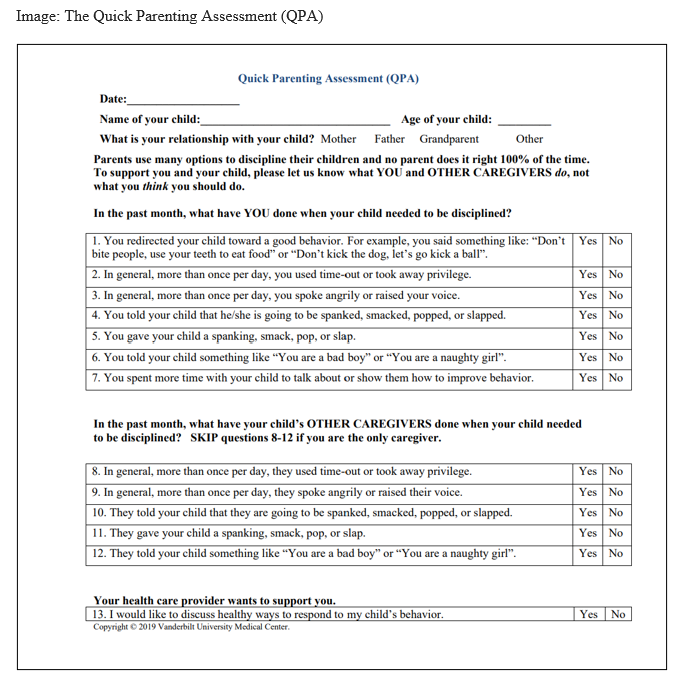General Pediatrics: Primary Care/Prevention
General Pediatrics 4
477 - Parents’ Interest in Discussing How to Discipline their Children in Pediatric Primary Care
Publication Number: 477.217

Victoria L. Carr, MD (she/her/hers)
Resident Physician
Monroe Carell Jr. Children's Hospital at Vanderbilt
Nashville, Tennessee, United States
Presenting Author(s)
Background: Some unhealthy discipline strategies, such as spanking, are associated with poor health outcomes and are perpetuated intergenerationally. To address this concern, the American Academy of Pediatrics recommends discussing discipline during pediatric primary care visits. However, to our knowledge no studies have described how often parents want to discuss discipline.
Objective:
To assess the percentage of parents who are interested in discussing discipline with their child’s healthcare provider and to assess associations with sociodemographic and other factors.
Design/Methods:
The Quick Parenting Assessment (QPA) is a 13-item validated instrument focused on parents’ disciplinary behaviors (Image). One QPA question assesses parents’ interest in discussing discipline, asking the parent if they want to “discuss healthy ways to respond to their child’s behavior.” In a clinic serving a diverse population, the QPA is routinely administered to parents at the 15 month, 30 month, 5 year, and 8 year well visits. Following these visits, parents were then invited to complete a brief survey on topics related to discipline. Measures included sociodemographic factors and if the parent was spanked as a child. 538 parents were invited to participate, 490 agreed and, of these, 228 parents had complete QPA data.
Results:
43% of parents identified as Black, 16% as Latinx, and 22% as White. Overall, 29% of parents reported they wanted to discuss discipline (95% CI from 24% to 36%). Parents using more unhealthy discipline strategies (QPA > 2) were more likely to want to discuss discipline (41% vs 26%; p=.036). 32% of parents who were spanked as children wanted to discuss discipline compared to 18% of parents who were never spanked (p=.06). Younger parent age and having fewer children, but not education level, were significantly associated with a parent’s interest in discussing discipline (Tables 1 and 2). When parents indicated a desire to discuss discipline, a discussion was more likely to occur (41% vs. 14%; p< .001). Conversely, for 59% of parents who wanted to discuss discipline, there was no discussion.
Conclusion(s):
Less than half of parents want to discuss discipline with their child’s healthcare provider. Fortunately, parents are more interested in discussing discipline if they are using unhealthy strategies. Efforts are needed to overcome barriers to discussions as they are not routinely happening, even when parents express interest. The findings have implications for reducing the poor health outcomes associated with exposure to unhealthy discipline strategies.
.png)
.png)
